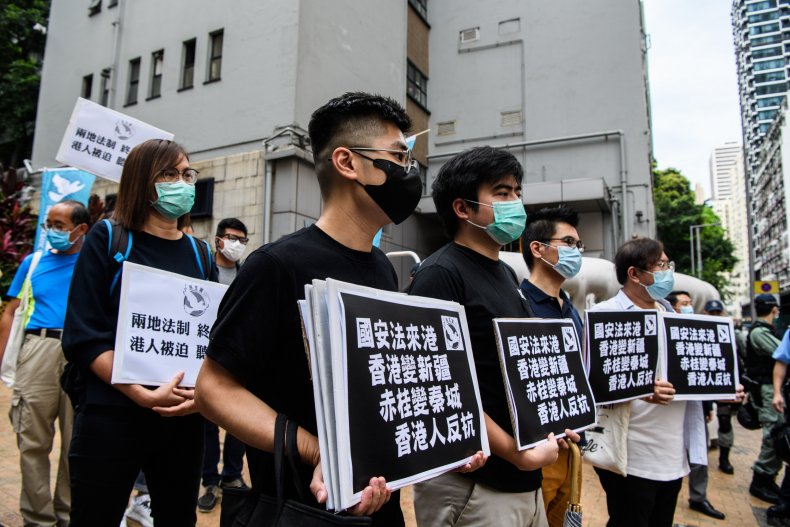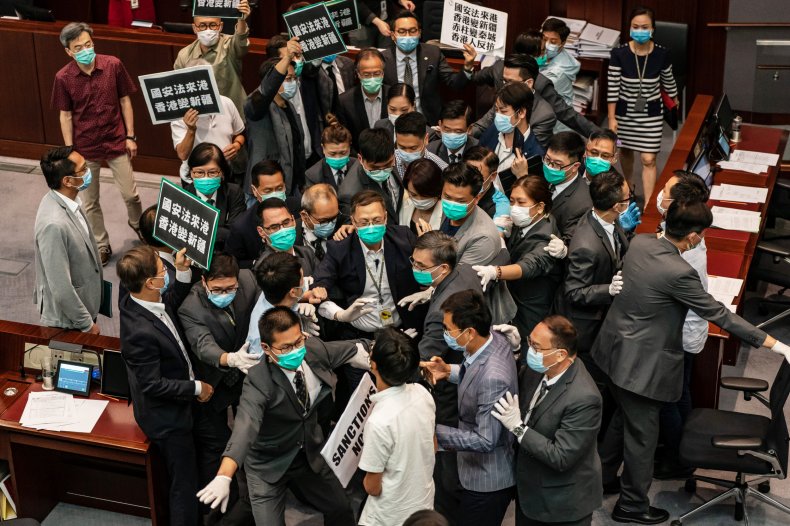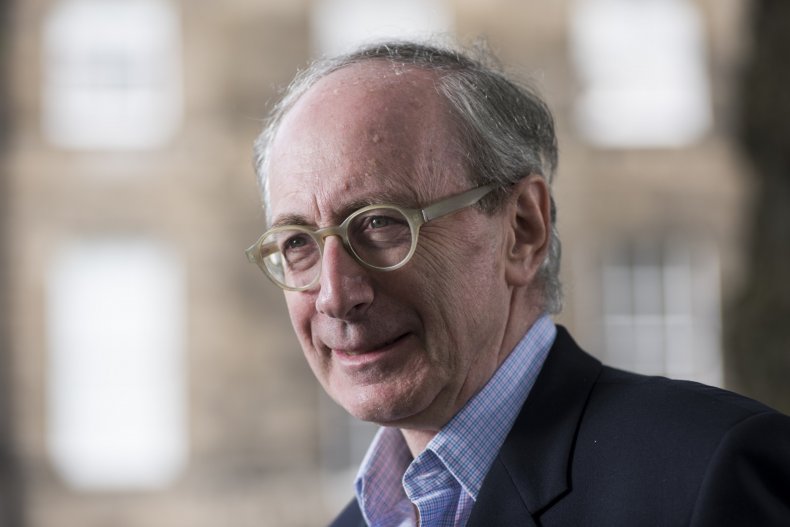BY BRENDAN COLE
 The move by China's ruling Communist Party to set in train a national security law for Hong Kong signals a crackdown on the city's freedoms and could spell the end to the autonomy it has had since the British handover of 1997, activists and analysts have said.
The move by China's ruling Communist Party to set in train a national security law for Hong Kong signals a crackdown on the city's freedoms and could spell the end to the autonomy it has had since the British handover of 1997, activists and analysts have said.
The controversial law that bans "treason, sedition, secession and subversion" in Hong Kong will be presented at China's National Party Congress (NPC), which has just started, and largely rubber stamps the leadership's wishes.
After months of unrest and anti-China protests in the city last year, the new law is seen by its opponents as a way to rework the "one country, two systems" arrangement in place over the 23 years since the British transfer of Hong Kong's sovereignty, which gave it a high degree of autonomy and self-governance.
Sir Malcolm Rifkind, who was the British foreign secretary in 1997, described the situation as "desperately serious" and that, as signatories to the treaty that ended its administration of Hong Kong, the U.K. had legal and ethical obligations to stand up for it.
Pro-democracy protesters pictured on May 22 oppose a proposal to enact new Hong Kong security legislation submitted by China's ruling party. Opponents fear it will erode Hong Kong's autonomy.ANTHONY WALLACE/GETTY IMAGES
"I think the initial question will be, will Hong Kong itself respond as it has done before? I suspect it will, but it needs international support," he told Newsweek.
"Hong Kong's current status is the result of an international treaty signed by China and the United Kingdom, lodged at the United Nations, which is meant to last for 50 years.
"Therefore, Britain has a legal, as well as a moral, and ethical entitlement to express its views and do so most strongly.
"Britain by itself isn't going to change the whole scene. It needs the United States, Europe and the Asian countries as well to express their solidarity with the people of Hong Kong.
"If you destroy Hong Kong's rule of law and its freedom, you destroy international economic confidence in Hong Kong...it will mean a constant and irreversible erosion of Hong Kong's ability to act as an economic hub, not just for itself but for China as a whole."
In 2003, an attempt to pass national security legislation into the Basic Law, which is Hong Kong's mini-constitution, failed, and hundreds of thousands took to the streets in protest. Last year there were further mass protests sparked by a bill that would have allowed extraditions to mainland China.
 Pro-Beijing lawmaker Starry Lee Wai-Kingis pictured during Hong Kong's House Committee's election of vice chairpersons on May 22. A move by Beijing to impose security restrictions in the city has sparked an outcry among those fearing for Hong Kong's autonomy.ANTHONY KWAN/GETTY IMAGES
Pro-Beijing lawmaker Starry Lee Wai-Kingis pictured during Hong Kong's House Committee's election of vice chairpersons on May 22. A move by Beijing to impose security restrictions in the city has sparked an outcry among those fearing for Hong Kong's autonomy.ANTHONY KWAN/GETTY IMAGES
The latest move by Beijing to effectively bypass Hong Kong's lawmakers is seen by critics as another move to stamp down on dissent and impose its authority, and has sparked outrage among pro-democracy activists.
On Friday, a group of protesters descended on China's Liaison Office in Hong Kong, the BBC reported, suggesting there could be a sequel to the protests and demands for democratic reform last year.
Bruce Lui, a senior journalism lecturer from Hong Kong Baptist University, said the speed of the latest move by China's Communist Party had taken him by surprise and signified its intention to "weaponize" the "one country, two systems" framework.
He also believed that growing tensions between the U.S. and China have "acted as a catalyst for China to make a decisive move."
"China has planned for this for a very long time, since the Occupy movement of 2014," he told Newsweek, referring to a series of pro-democracy sit-in street protests, also known as the Umbrella Movement.
"I think this is clearly the end of 'one country two systems' because the kind of laws China wants has a very broad definition and the party can define who is a criminal and who is not."
Steve Tsang, director of the China Institute at the London-based School of Oriental and African Studies (SOAS), said the seeds of the current situation were sown when President Xi Jinping included Hong Kong in the Greater Bay Area as part of a drive to develop major metropolitan clusters.
"In this new paradigm, the value of Hong Kong is not as a completely separate and stand alone SAR but as a key part of the Greater Bay Area which can play a role that even Shenzhen cannot play," he told Newsweek.
 Former U.K, foreign Secretary Sir Malcolm Rifkind, is pictured in 2016 in Edinburgh, Scotland.GETTY IMAGES
Former U.K, foreign Secretary Sir Malcolm Rifkind, is pictured in 2016 in Edinburgh, Scotland.GETTY IMAGES
Xi signaled his intent to take a hard line on Hong Kong protesters in 2020 when he appointed Luo Huining as head of the Chinese government's liaison office there.
This was bolstered by his appointment of Xiao Baolong to head the Hong Kong and Macau Affairs Office in February, Tsang said.
"So, the direction of travel is not a surprise. The way it is being done was not expected by me," he said.
"Enactment of the law is not the end of Hong Kong but the end of the 'one country, two systems'. Hong Kong is a very resilient place and it will find a new place for itself, albeit, a diminished one."
Beijing has emphasized that it was asserting control through the "improvement" of the Basic Law, according to Wang Yang, who heads the Chinese People's Political Consultative Conference, the Washington Post reported.
Zhiqun Zhu, who is a member of the National Committee on United States-China Relations, said following last year's protests, Beijing had become impatient.
"From Beijing's perspective, the mass and often violent protests in Hong Kong in 2019 damaged Hong Kong's status, spoiled Hong Kong-Mainland relations, and challenged the Central Government's authority," he told Newsweek.
"This is also playing out against the backdrop of growing tensions between China and the West. Beijing suspects that pro-democracy activists and separatists in Hong Kong are colluding with 'evil foreign forces' to destabilize Hong Kong and to promote anti-China sentiments in Hong Kong.
"I think Beijing hopes to eliminate all those perceived radical anti-China forces in Hong Kong so that Hong Kong will perhaps become more like Macao—more subservient and focusing on making money, and not causing 'trouble' for Beijing," added Zhu, who is also professor of political science and international relations at Bucknell University, in Lewisburg, Pennsylvania.
When the NPC approves the measures, mainland officials will start to execute national security law in Hong Kong, meaning that dissidents would be sent to mainland China to face justice, Eric Cheung, principal law lecturer at Hong Kong University, said.
"It amounts to a de facto declaration by Beijing that 'one country, two systems' has failed and it amounts to Beijing telling the whole world that the original design of the whole law doesn't work," he told Newsweek.
"Beijing must have contemplated the reaction of people before they made the decision and they all know that the European countries and the United States are busy with dealing with the COVID-19 pandemic."
Correction 5/26/20, 12:30 p.m. ET: This report was updated to correct the spelling of Bruce Lui.
No comments:
Post a Comment